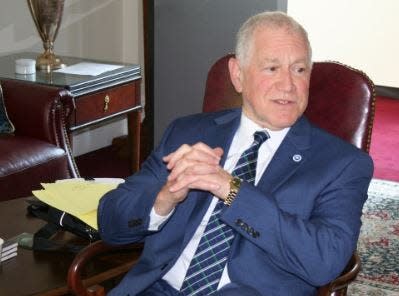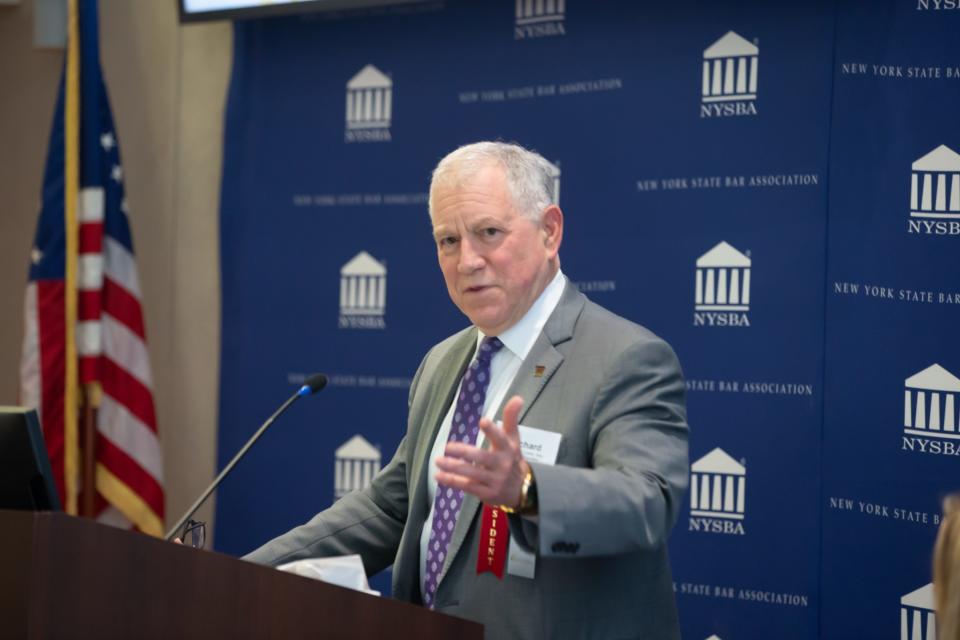Megan McDonald murder: Can a lawyer ever divulge client's secrets?
The conversations David Hoovler had with Andre Thurston in 2008 about the Megan McDonald murder are protected by attorney-client privilege, one of the bedrock principles of our legal system.
In 2008, years before he was elected DA, Hoovler the defense attorney would not name his client as he tried to trade information about the murder in exchange for a lesser manslaughter plea. Eleven years later — on March 20, 2019, the ninth anniversary of Thurston’s death — Hoovler for the first time named him as his client, in a meeting with police and members of his staff, an internal State Police report says.
That revelation drew concern from Paul Weber, who is representing Edward Holley, the man charged in the McDonald murder.
"New York State Rules of Professional Conduct regarding attorney-client privilege specifically prevent an attorney from revealing information learned as a result of the attorney-client relationship and that privilege survives even after death of the client," Weber said. "There are several exceptions to that rule but the specifics of this case, as I see them, do not fall within any of those exceptions.

"If the allegations the State Police are making are true, it appears that there was a serious breach of the Rules of Professional Conduct," Weber said. "As for what repercussions there will be in the future, that remains to be seen. His former client's family has every reason to be upset if the allegations are true and the specifics do not fall within any of the exceptions."
Nina Schutzman is the mother of Thurston's son and the fiduciary of his estate. Efforts to reach her, through her father and attorney, Stanley Schutzman of Poughkeepsie-based Hanig, Handel and Schutzman LLP, were unsuccessful. Nina Schutzman is a former reporter for The Poughkeepsie Journal.
At that March 2019 meeting when he named Thurston, Hoovler told police and members of his staff that Thurston had said he had information about a homicide, but said Thurston did not specify to him which homicide. That retelling of events is refuted by notes taken in 2008 by Assistant District Attorney Maryellen Black Albanese, and by a record of Hoovler’s initial call to Senior District Attorney John Geidel, which says Hoovler identified the McDonald homicide from the outset as the one his client witnessed.

How attorney-client privilege works
Without commenting directly on the McDonald case, Richard C. Lewis, president of the New York State Bar Association, spoke about attorney-client privilege.
“The attorney is obligated to devote all of his efforts on behalf of the client,” Lewis said. “Unless the client has given him authority to reveal something, he has an ethical obligation to stand by his client and has an ethical obligation to maintain the privilege of confidentiality.”
That confidentiality lasts, even after the client dies, Lewis said.
“Does attorney-client privilege survive death? The answer to that is yes. It does survive death,” Lewis said.
“Attorney-client privilege can be waived during a person's lifetime, obviously for the purposes of negotiations. If, for example, a guy's trying to make a deal and he tells his lawyer: 'Look, I can give this information in exchange for a plea deal,' then he is basically authorizing his attorney to go forward, sort of in a circumspect way. The client's going to say: 'Maybe I can provide information.'”
Can a lawyer be released from privilege after a client dies? That is a bit thornier, Lewis said, and it depends on where you live in New York, in which geographical appellate division department.
The first department is Bronx and New York counties. The second takes in Long Island, Queens, Brooklyn, Staten Island and the Hudson Valley, including Orange. The third covers the Southern Tier and the Catskills, the Capital Region to the Canadian border. The fourth is Central and Western New York.

“The waiver would have to be done by the executor,” Lewis said. “In some departments, it can be. In other departments, it cannot be. The third or fourth departments say that you can have a waiver by the executor and others do not. It's not a well-settled situation. And the conditions under which you could do it are not necessarily consistent from department to department. And I don't believe to my knowledge that there has been a Court of Appeals case on it. I don't know that for sure."
A ruling by the Court of Appeals would make the executor-waiver decision apply across the state. In the absence of that, the rules vary, Lewis explained.
Not at issue, Lewis said, is the unbending concept of attorney-client privilege.
“The privilege is the privilege of the client. The privilege is not the privilege of the attorney,” Lewis said. “There isn't that ability for the attorney to say, 'Yes, I think I should say this or that.' It's solely up to the principal (client).”
Reach Peter D. Kramer at pkramer@gannett.com. Support this kind of reporting by subscribing, at www.lohud.com/subscribe.
This article originally appeared on Rockland/Westchester Journal News: Megan McDonald case: Can Hoovler tell what his now-dead client said?

